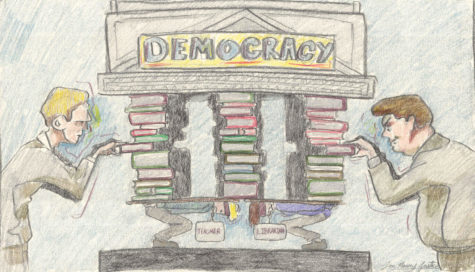The Mandela Effect
Confabulation is defined on Dictionary.com as “the replacement of a gap in a person’s memory by a falsification that he or she believes to be true.” This term is used by many psychologists to explain how humans can sometimes “remember” something that didn’t actually happen or change small details from a memory into a falsified version of the actual events–all without the person consciously knowing their memory wasn’t entirely accurate.
However, though science has theorized this aspect of human memory loss and distortion, many different people have started to notice a pattern in what they remember. All memories are so strikingly similar, a vast conspiracy has begun about whether these memory losses were ever truly lost to begin with. This idea–causing a stir among many and slowly becoming a popular internet topic–is a conspiracy called the Mandela Effect. The conspiracy claims that due to an identical lapse in several memories that many people have experienced, humans and the planet itself must have experienced a shift in realities without even knowing about it. Thus, it is assumed that the universe many grew up in is not the same they are living in today, and though the two realities seem similar in many respects, small changes in our everyday lives prove this jump from timelines.
Reasonably, one of the most popular pieces of evidence that back up the Mandela Effect is the “Berenstein/Berenstain” wonder. Teenagers and adults alike have recently discovered that the popular children’s show and books “The Berenstain Bears” they spent years of their lives watching and reading isn’t actually spelled as they thought– instead of the “ein”, near the end, it has actually been “ain”, as it’s printed on all of its sources. The spelling conflicts with memory and with the pronunciation of the title we’ve known for years, and many are baffled by it.
Some further proof includes Disney movie “Snow White and the Seven Dwarves,” when the Evil Queen looks into the mirror, and says “Magic mirror on the wall, who is the fairest of them all?” We grew up thinking she said “Mirror Mirror,” and the Mandela Effect claims that in our past universe it was actually the double mirror saying, but suddenly we woke up one day after sliding from one universe to the next and it was changed.
Additionally, in “The Empire Strikes Back,” the fifth chapter of the Star Wars movies, Darth Vader is famously quoted “Luke, I am your father.” This quote might not be as accurate as previously thought because writers and re-watchers of this famous scene recount the quote as being, “No. I am your father.” People choose to think that this is even harder evidence of our universes becoming parallel.
The name of this conspiracy originates from Nelson Mandela, a South African president who spent 27 years in prison. When Mandela died on Dec. 5, 2013, at the age of 95, a wave of confusion hit many, as they had been sure Mandela had passed while serving his time in prison. The connections people shared of this contrary thought branched into the conspiracy.
Whether or not the Mandela Effect is possible or if we’re experiencing it as it’s claimed to be, it cannot be denied that the evidence is still a strange occurrence nonetheless. Perhaps the most fascinating aspect of the conspiracy is the fact that so many people have claimed to all have the same lapse in memory about the same things despite the distance between them, or the fact that many have never spoken to each other in their lives. If the conspiracy were to be true, it could very well go against much of what science has theorized about our universe. The Mandela Effect is a phenomenon that has yet to be proven, but is a thought worth considering, especially for those who are into conspiracy and the unknown.





